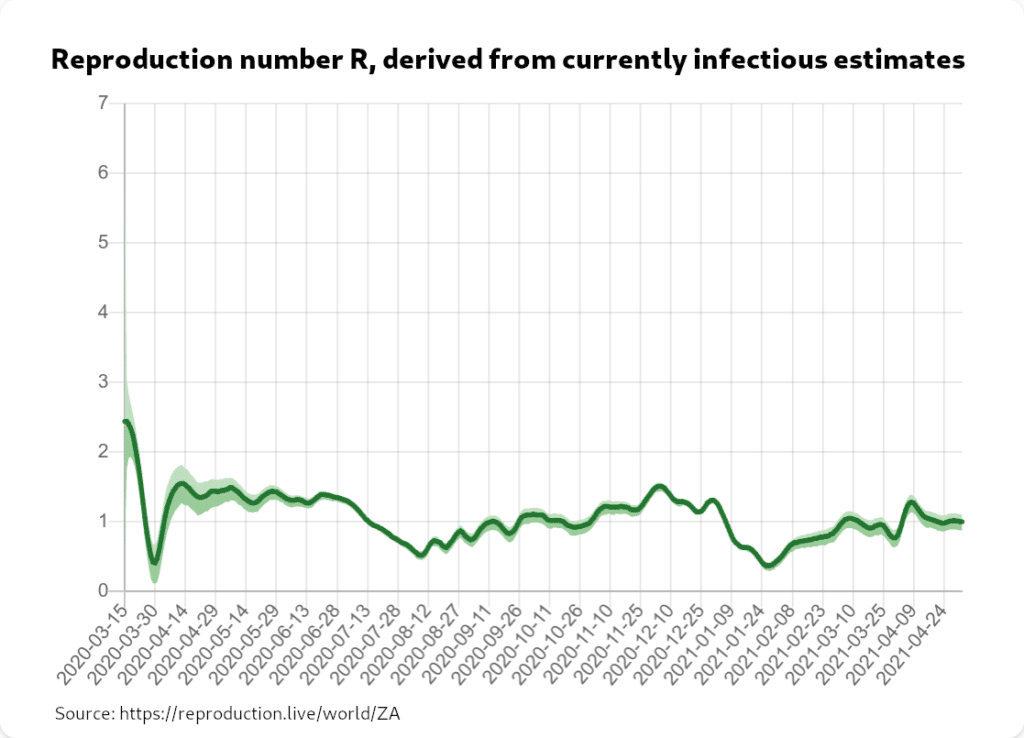Despite a dearth of evidence of a third wave in South Africa, government is considering imposing new restrictions, just in case. This is very poor policy.
Terrified by sensational news coverage of a large second wave of Covid-19 in India, health minister Zweli Mkhize announced last week that government is considering introducing additional lockdown measures in order to stave off a third wave in South Africa.
Reportedly, it is acting on ‘an advisory from the ministerial advisory council that we have to consider some restrictions’.
Probably not coincidentally, the South African Covid-19 Modelling Consortium (SACMC) published an update entitled ‘Considerations for a potential third wave’.
Its summary makes statements such as: ‘The peak of the 3rd wave is expected lower than the 2nd wave.’
This makes it sound as if its models confidently predict a third wave, but that is not true.
The SACMC’s paper lists a number of ‘potential drivers of a third wave’, namely ‘behaviour change after the end of the last wave’, ‘ongoing viral mutation’, ‘seasonal factors’ and ‘reinfection due to the waning of immunity conveyed by previous infection’.
Hypothetical
The problem is, these drivers are all ‘potential’. They’re all hypothetical. There is no evidence for any of them. All the group did was to model a third wave as if those drivers were present, based on thumb-sucks about how significant those drivers might be.
South Africa is not India. South Africa already had its second wave. Unlike India, South Africa has not had massive religious festivals, or held elections with hardly any precautions. Reacting to events in other countries with domestic lockdown restrictions is absurd.
While one might expect, for example, that the virus will spread more readily in winter, South Africa’s first wave started in the late summer and ended in mid-winter, while its second wave occurred in high summer. India’s second wave is also started in its springtime, and is growing into its summer. There is no evidence of seasonality. If anything, the virus seems to be more active in summer.
There is no evidence of any new mutations circulating in South Africa. There is, of course, concern that the variant circulating in India does not begin to spread in South Africa, but to date, it is not doing so.
There is also no evidence of substantial numbers of reinfections due to waning immunity. It happens, but not in high numbers.
There is no hard evidence of behaviour change among the population, either. If people are getting more lax with precautionary measures, then a campaign to recommend continued adherence to sanitary protocols – such as handwashing, masking, social distancing, ventilating indoor spaces, and avoiding crowded places – would be indicated. New lockdown measures won’t achieve that. After all, the rules and penalties for such measures remain in place.
No sign of uptick
There is also little evidence of a third wave in the data. The SACMC paper actually acknowledges that, saying: ‘Monitoring trends in cases is the best indicator of when a 3rd wave is likely to begin.’
Countrywide, there is no sign of a sustained uptick in the number of people who are estimated to be currently infectious – a figure derived from the daily new case numbers:

After a brief scare at the beginning of April, there is also not much to worry about in the effective reproductive number of the virus. At the time of writing, it sits at exactly 1, which means the outbreak is neither growing nor decreasing:

From these high-level stats, it is clear that there is no third wave on the horizon yet.
A deeper dive into the SACMC’s Epidemic Explorer dashboard suggests that there are some regions, notably the Free State, where the new cases per week do show an uptick that might indicate the start of a third wave, but its alert thresholds are both low and arbitrary, and the occasional deviation in local or regional charts hardly justifies nationwide lockdown measures.
Easter wave never happened
The lockdown rules were significantly relaxed ahead of the Easter holidays. This indicates that while the government doesn’t care about business, employment, or the mental health of the general population, it is highly sensitive to the demands of religious groups, who wanted to hold super-spreader events during that time.
Despite those relaxations, there was only a small blip on the reproductive number radar, which was hardly visible in the number of new infections.
This confirms what we already know: lockdown restrictions are largely ineffective. In part, this is because they cannot be enforced in many parts of the country. Social grant queues continue as if nothing ever happened. Taxis are packed full, as if there is no pandemic. Closing public spaces such as parks and beaches just drives people away from the safest places they could possibly be, and back to crowded malls, homes, or bars and restaurants. Restricting opening hours increases crowding and limiting gatherings at controlled venues pushes people to uncontrolled venues.
Multiple scientific studies have found that lockdowns have not been associated with fewer severe cases of, or fewer deaths due to, Covid-19.
The widespread fear of a third wave sparked by Easter gatherings did not materialise, despite the relaxation of lockdown rules. There is no reason to believe that a third wave will now appear out of nowhere.
Baseless speculation
All the fearmongering is founded upon baseless speculation, and panic over what’s happening 8 000km away across the Indian Ocean.
Basic sanitary precautions have some effect, and it would be advisable to sustain them. By contrast, heavy-handed restrictions on freedoms and economic activity have proved to be unjustifiable even during a resurgence of the virus.
At present, there is no such resurgence. Proposing to kick the economy while it’s down based solely on irrational fear would be stupid, vindictive, or both.
There’s an old Dutch proverb that says a donkey doesn’t kick against the same rock twice. If even a donkey can learn, surely the government can learn that lesson, too?
The views of the writer are not necessarily the views of the Daily Friend or the IRR
If you like what you have just read, support the Daily Friend

